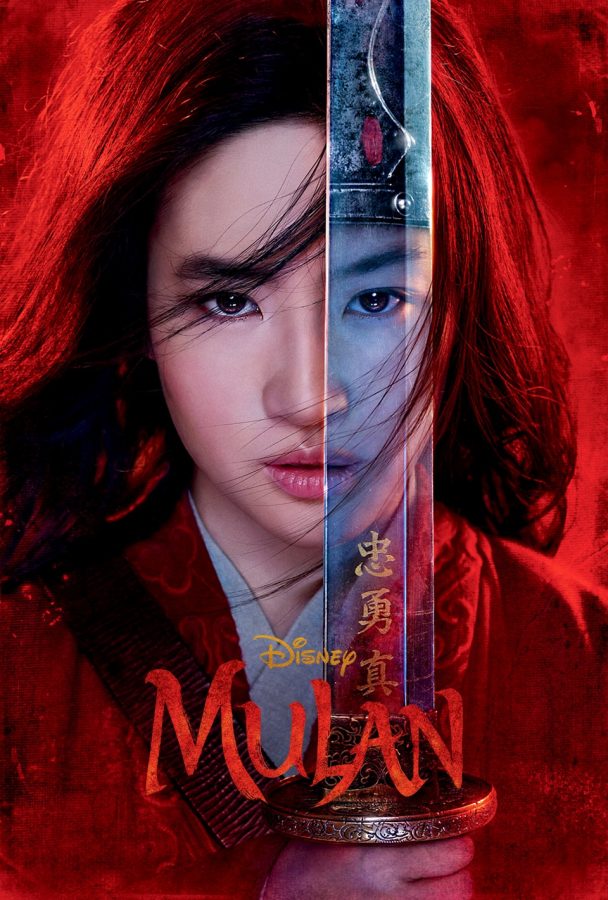Loyal, Brave, and True: Mulan (2020) Review
Staff Reporter Avril Yu reviews Mulan (2020), in comparison to the original Disney animated film.
Who is that girl I see? In a 2020 live-action remake of the beloved 1998 animated film, actress Liu Yifei stars as the titular Mulan. An energetic, adventurous young woman, Mulan lives in a small rural village in China during the Northern and Southern dynasty. When the emperor of China rules that every household must volunteer one man to fight against the Rouran army led by the fierce Bori Khan (Jason Scott Lee), Mulan’s elderly father Hua Zhou (Tzi Ma) is forced to volunteer his service to the military, as he is the only man in his family. With the fragile state that he is in, Mulan realizes that her father has little chance of returning from the battlefield. In the dead of night, she sets silk aside for iron and rides off to war with her father’s set of armor, his horse and his gleaming sword, posing as a man.
This new story of Mulan is faced with the same challenge all retellings of well-known pieces of media experience: it must strive to have the traits which captured so many fans in the original animated film, while also carving out its own, unique path alongside it. Although at times it’s difficult to see the movie for anything beyond what is glaringly missing in comparison to the animated version, Mulan does a remarkably good job of blazing its own trail. The colors and landscapes in this movie stand out like they never have before. In the beginning, a wide shot over the Imperial City in China harks back to the grand outlines of Xi’an, with buildings in the far background that even look like the Great Wild Goose Pagoda. The emperor’s throne room is a dazzling gold, beautiful and intricate. And when Mulan returns to the battlefield, her vivid red uniform shines out so brightly against the gray backdrop, it’s like I’m only seeing this color for the very first time.
Noted absences of this film are Mulan’s humorous grandma, her lucky cricket and Mushu, the talking dragon. A new role is created to fill in the space: the fearful witch Xianniang (Gong Li), who can shapeshift into a falcon and also steal the forms of others. As the secondary antagonist, she perches by Bori Khan, but her disenchantment with him grows steadily as the movie progresses. While many fans considered her addition unwelcome, I found her to be, at times, even more interesting than Mulan. In her attempt to control Mulan, Xianniang tries to persuade her to abandon the place which looks down on her for being a woman, and instead join her. Xianniang makes a compelling case, and over the length of the movie, I thought that her character had a surprising amount of depth and power. To my disappointment, her storyline is cut off abruptly, leaving a hole in the story even bigger than the one she was meant to fill.
While Xianniang’s role shows how this film is darker and grittier than the original, it doesn’t seem to forget its roots. Even if this version of the story is more of a pounding tale of war and less a series of musical numbers, Mulan’s experiences with the soldiers at the camp are humorous and reminiscent of her clumsiness in the animated film. During a pivotal point of the film, her entrance is also underscored with a stunning instrumental version of “Reflection,” the most memorable song from the 1998 Mulan.
Although this film lacks an Asian director, it’s certainly a large milestone for Asian representation on screens: every character in the movie is casted correctly, and the credits are stacked with some of the most well-known names in China.
All in all, Mulan (2020) is full of lovely, cinematic visuals and well-choreographed fight scenes which engage and astonish the watcher. But, at its heart, it lacks a few traits of what one would consider to be the core of a Disney film. The screenplay is a bit dull, and some parts require much suspension of disbelief for the purpose of enjoyment. Still, this Mulan is as loyal, brave, and true as her animated self is, even with some key differences. Mulan’s story of being yourself in a world where that self is not always welcome is a story that — I think — is certain to hit home across the ages.
Your donation will support the student journalists of Troy High School - MI. Your contribution will allow us to print our work, purchase equipment and cover our annual website hosting costs.


